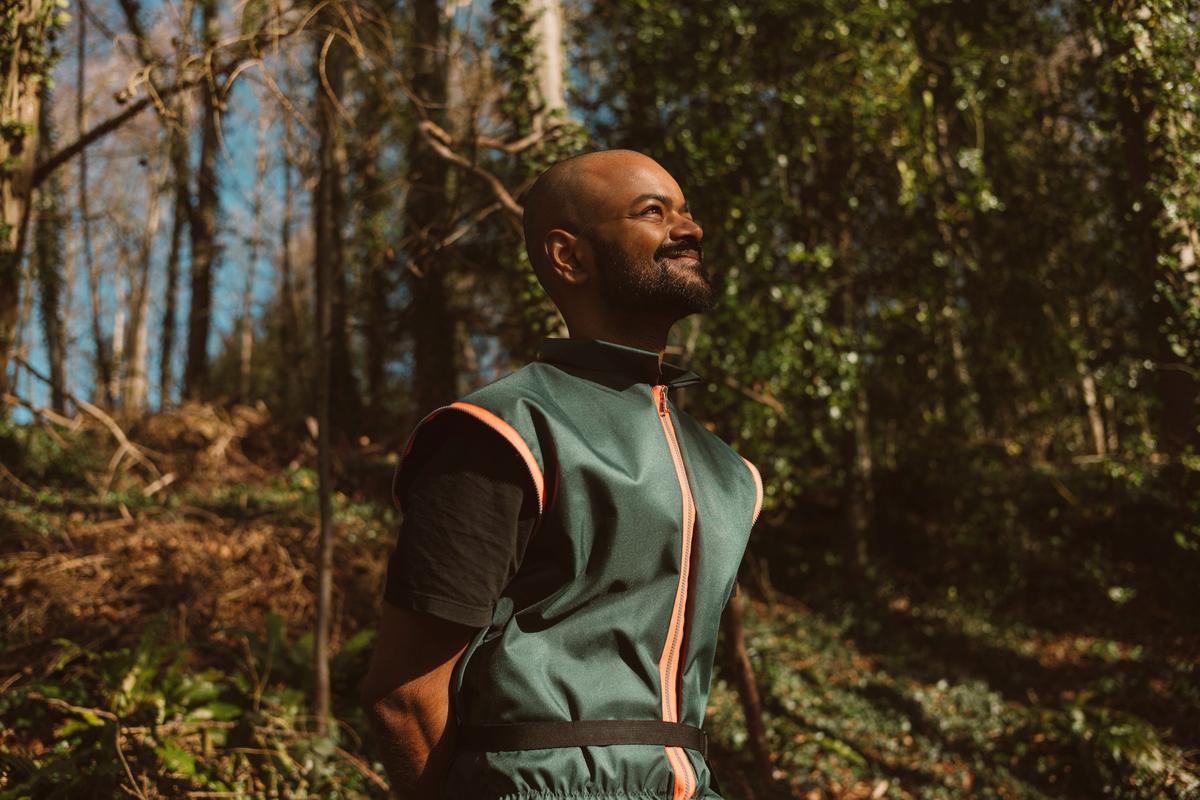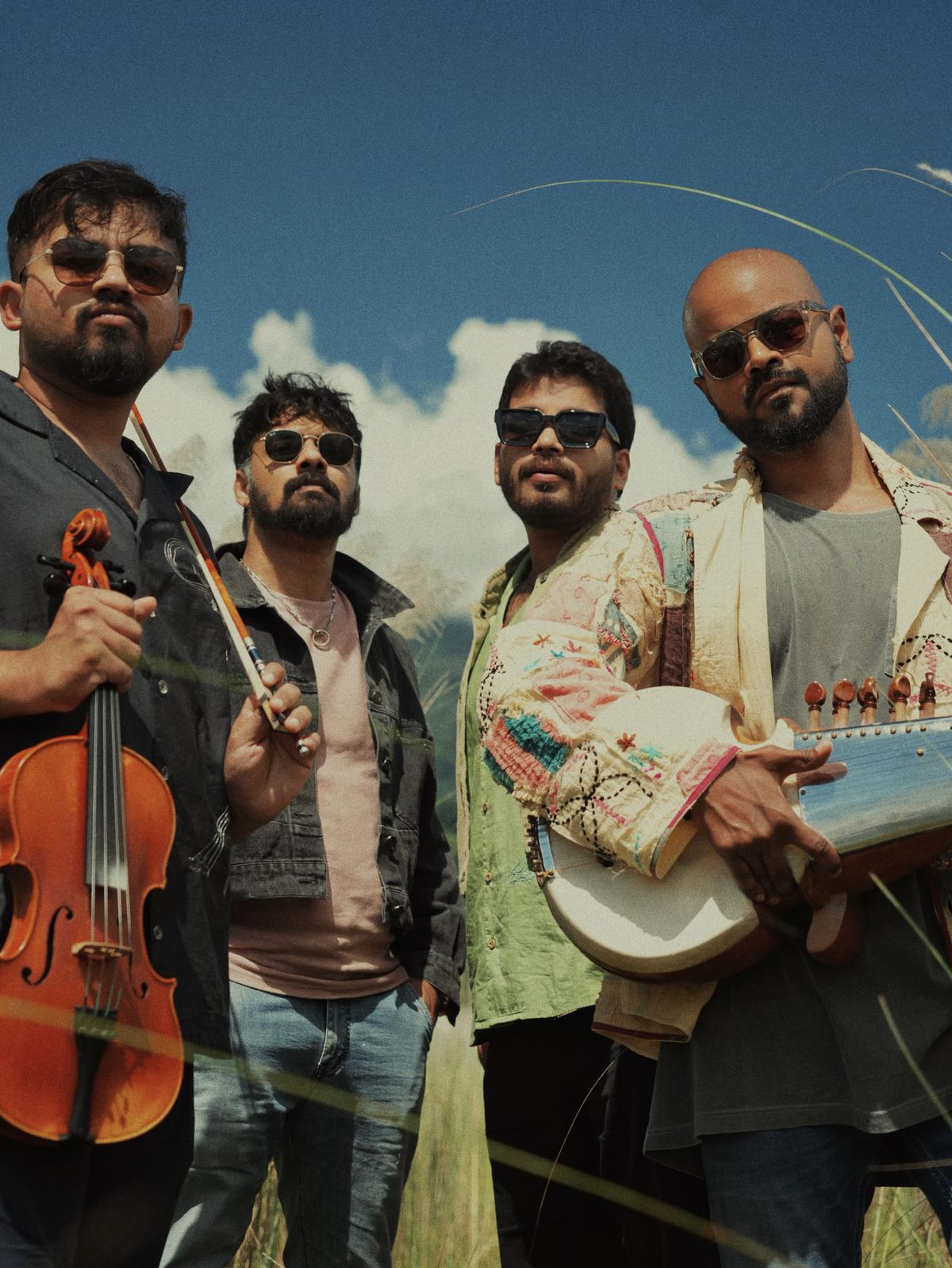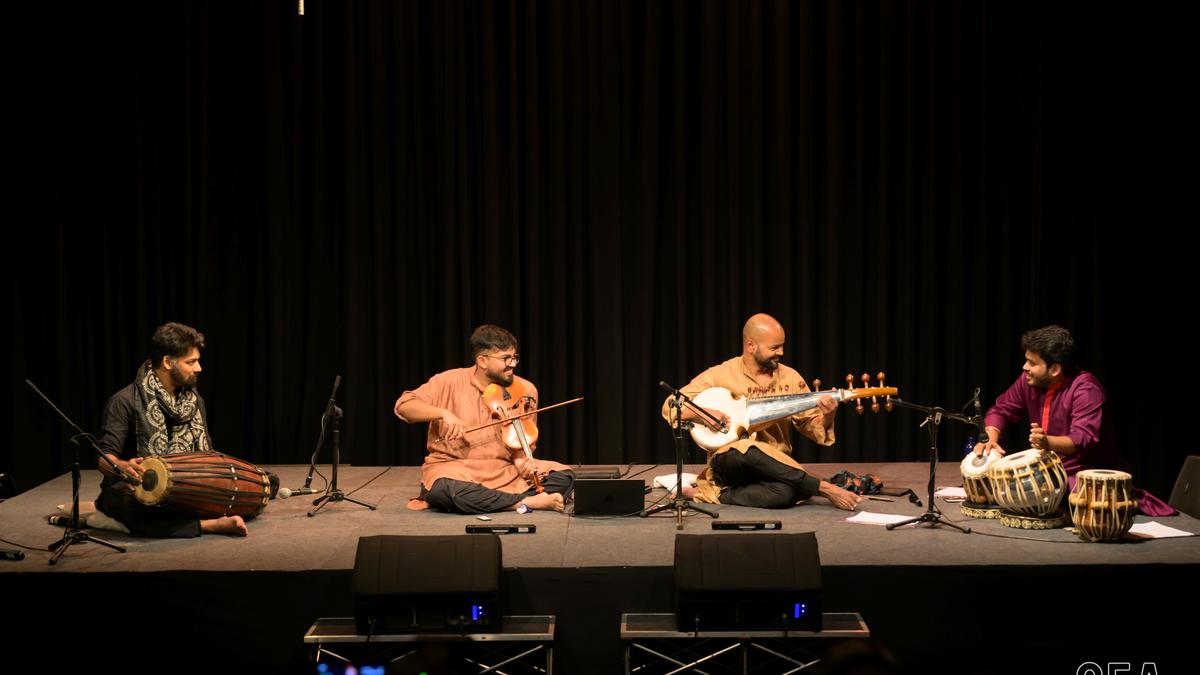
Sumesh Narayanan, Sayee Rakshith, Soumik Datta and Debjit Patitundi collaborate for ‘Travellers’
| Photo Credit: Special Arrangement
Award-winning sarodist, Soumik Datta, is all set to tour the country with a new immersive show ‘Travellers’. Having started in Mumbai on October 10, he will travel with it to Bengaluru on October 30 at Bangalore International Centre and Sabha BLR on October 31, Ahmedabad on November 2, Jaipur on November 7 and Delhi on November 13. ‘Travellers’, which was developed during a summer residency at G5A earlier this year, unveils a genre-blending soundscape where Indian classical roots meet ambient textures, spoken word and field recordings.
Over the last few years, Soumik’s work has been exploring the space between the sheer beauty of Indian classical music and the grim reality of urgent humanitarian issues. “Now more than ever, it feels almost impossible to play music for the sake of music, without using that platform to draw attention towards our shared crises. With ‘Travellers’, my intention is to discover a piece that was driven by the urgency of the moment, our raw, complicit feelings of helplessness and grief. The heartbreaking images of displaced families and the suffering in Gaza created an emotional state, that became the foundation of the music,” he says.

Soumik Datta
| Photo Credit:
Daniel Dittus
The tracks in ‘Travellers’ are unusual. “Some lines go from played to spoken to sung. The pieces erupt with exclamations and theatrical moments which require a lot of concentration from us,” shares Soumik. The show has him collaborating with Sayee Rakshith (violin), Debjit Patitundi (tabla), and Sumesh Narayanan (mridangam and percussion) and together they form the quartet at the heart of ‘Travellers’. “It’s been refreshing to meet artists who are both anchored to their tradition and free to explore the outermost fringes of their music. Where we align is in our collective search for new languages,” states Soumik.
At its heart is the sarod’s evocative tune, layered with violin, tabla and percussion to create what Soumik calls “ear cinema. I’ve enjoyed films. There’s a huge amount of information in the score, the foley and of course, the dialogue. That aural space has always been magical to me but I never thought I would explore it in such depth and detail as we have in ‘Travellers’,” he explained. Using field recordings and audio clips from real life drives the experience of the show towards the documentary space. “Imagine blending a live music concert with a documentary feature film about the humanitarian crisis today. Now take away the video and you’ll come close to the world of ‘Travellers’,” he elaborates.
At times the music is jarring, at others the sarod’s deep, melancholic tones speak to the human spirit’s enduring search for solace. The news broadcasts serve as a harsh, unyielding reminder of our reality, and the cries of refugees are the raw, unfiltered voice of humanity in its most vulnerable state. “The goal was to create a soundscape that held all these elements in a single, coherent piece. It was about actively sharing that raw feeling and inviting the listener to feel the same sense of urgency. It’s a piece that doesn’t offer easy answers, instead asks us to bear witness, to feel and confront the uncomfortable truth of what is happening in our world,” he adds.
For Soumik, music transcends borders, reminding him that this is not merely a profession. ‘Travellers’ approaches the subject of nation and land through soundscape and layers field recordings and immersive sound design with a virtuosic band to transport audiences across the invisible borders that divide land, places and people. Woven through music, one hears the cries of refugees being deported, plea of news reporters in Gaza and the solemn warnings of historical personalities such as Oppenheimer. The sound of missiles echo across the speakers, counter-balanced by the sound of sarod, violin and percussion.
“We live in a world where the issue of borders and access is an unavoidable subject of discussion. Who has the permission to cross over? Who is denied safe passage? Fragmented culture and a skewed focus on a country’s economic strength have further driven this sense of division,” says Soumik. At one point, in the show, it transitions into Pete Seeger’s song ‘This Land is Your Land’ singing and playing along with his recording. At times, the audience joins in. “And it’s heart-warming to witness that in music, there is no permission or denial. Anyone can join in and be a part of it,” he says.

The quartet at the heart of ‘Travellers’.
| Photo Credit:
Special Arrangement
‘Travellers’ is part of Soumik’s seven-month long India tour called — Melodies in Slow Motion — which will take him to all the corners of the country to perform, collaborate with young musicians, record in unusual spaces and work with schools and children. ‘Melodies in Slow Motion’ is his attempt to try a new model of touring, giving time to meet people across India. Between the shows, Soumik will visit schools and conduct workshops to show how music can be a tool to build empathy. “I want to encourage students to think about their friends’ and teachers’ mental health and how it connects to their shared environment. I want them to glimpse into the interconnections between compassion, class, caste and climate change,” he says.
Soumik also plans to launch ‘Travellers’ as an album and tour the UK and Europe.
Published – October 23, 2025 06:30 pm IST



